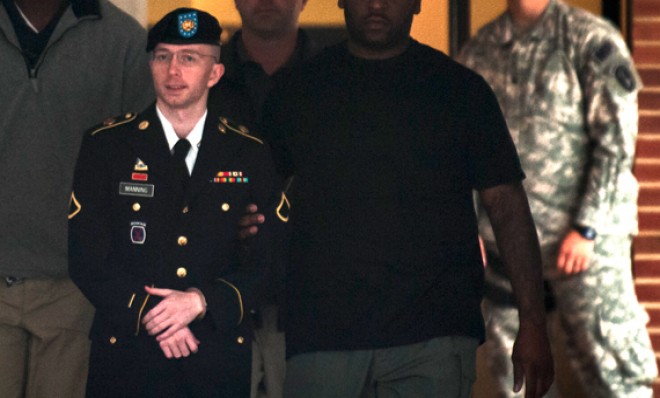Bradley Manning found not guilty of 'aiding the enemy'
The Wikileaks leaker could still spend the rest of his life in prison for convictions on other lesser charges


A free daily email with the biggest news stories of the day – and the best features from TheWeek.com
You are now subscribed
Your newsletter sign-up was successful
A military judge on Tuesday found Pfc. Bradley Manning not guilty of aiding the enemy, but still convicted him on 20 lesser counts, including five charges of violating the Espionage Act.
Manning, the former military intelligence analyst who leaked classified government cables to WikiLeaks, faced 21 counts in total, including espionage, computer fraud, and theft. Yet the most serious — and controversial — accusation against him was that he had deliberately "aided the enemy," a charge that carries a potential life sentence with no chance of parole.
Manning will be sentenced tomorrow morning and could face up to 136 years in prison, though he is unlikely to be hit with the maximum sentence.
The Week
Escape your echo chamber. Get the facts behind the news, plus analysis from multiple perspectives.

Sign up for The Week's Free Newsletters
From our morning news briefing to a weekly Good News Newsletter, get the best of The Week delivered directly to your inbox.
From our morning news briefing to a weekly Good News Newsletter, get the best of The Week delivered directly to your inbox.
Manning was arrested three years ago while still serving in the Army, and accused of leaking some 700,000 government files, videos, and diplomatic cables, in what was by far the single biggest leak of government information in U.S. history. Now 25 years old, Manning has been held in military prison facilities ever since, becoming a symbol for anti-secrecy advocates who believe he had done nothing more than expose shady government actions Americans and the world had a right to know about.
The government argued throughout the case that Manning's actions constituted a serious breach of national security that endangered the lives of American soldiers and jeopardized the nation's delicate diplomatic relationships around the world. By knowingly dumping reams of classified data concerning Washington's intelligence-gathering and counterterrorism operations, the government argued, Manning had clearly aided the enemy.
Yet Manning's defenders — among them freedom of information proponents like WikiLeaks and the hacker collective Anonymous, as well as various human rights organizations — argued that charge went way too far. While Manning has admitted to leaking government documents, he and others contended that simply passing that information along to a third party — WikiLeaks, not Manning, ultimately made that intel public — did not itself constitute aiding the enemy.
If Manning had been convicted of aiding the enemy, the ruling could have had broad, disturbing implications not only for whistle-blowers, but for newspapers that published sensitive national security information.
A free daily email with the biggest news stories of the day – and the best features from TheWeek.com
Earlier this month, the judge who presided over the case, Colonel Denise Lind, denied a request from Manning's lawyers to throw out the aiding the enemy charge. In a subsequent statement, Amnesty International called on the government to immediately drop that charge.
"The government's case for 'aiding the enemy' is ludicrous, and that's not surprising," wrote Widney Brown, senior director for international law and policy at Amnesty International. "What's surprising is that the prosecutors in this case, who have a duty to act in the interest of justice, have pushed a theory that making information available on the internet — whether through Wikileaks, in a personal blog posting, or on the website of The New York Times — can amount to 'aiding the enemy.'"
Manning pleaded guilty in March to 10 separate, lesser charges.
Jon Terbush is an associate editor at TheWeek.com covering politics, sports, and other things he finds interesting. He has previously written for Talking Points Memo, Raw Story, and Business Insider.
-
 Why are election experts taking Trump’s midterm threats seriously?
Why are election experts taking Trump’s midterm threats seriously?IN THE SPOTLIGHT As the president muses about polling place deployments and a centralized electoral system aimed at one-party control, lawmakers are taking this administration at its word
-
 ‘Restaurateurs have become millionaires’
‘Restaurateurs have become millionaires’Instant Opinion Opinion, comment and editorials of the day
-
 Earth is rapidly approaching a ‘hothouse’ trajectory of warming
Earth is rapidly approaching a ‘hothouse’ trajectory of warmingThe explainer It may become impossible to fix
